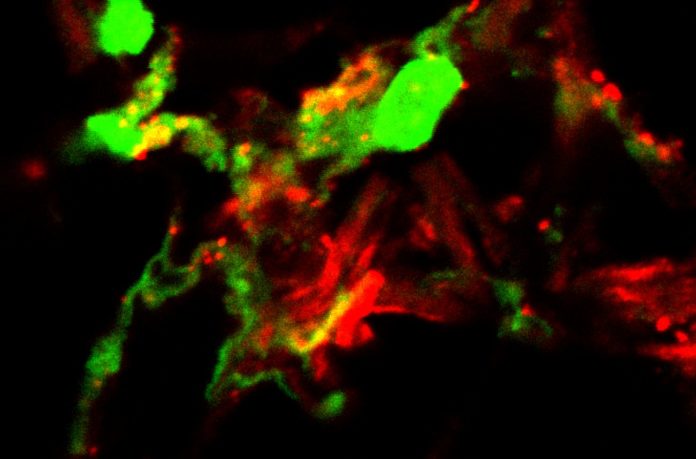The findings suggest ways to stop autoimmunity without affecting normal immune responses.
Researchers from Weill Cornell Medicine and Hospital for Special Surgery found that chemokines, small proteins that guide immune cells to infection sites, can also produce DNA-bound nanoparticles that can elicit chronic, dysfunctional immune responses (HSS).
This type of immune signaling molecule has been studied a lot, so it was surprising to find out that it has a new job to do. This could help explain some immune disorders.
The study was published on May 31 in the Journal of Experimental Medicine. It shows that chemokine-DNA nanoparticles can cause inflammation by triggering the immune system in a completely new way.
Results from preclinical models imply that this pathway might be crucial in autoimmune disorders like lupus and scleroderma.
The research was conducted as part of the scientists’ continuous efforts to gain a better understanding of scleroderma, an inflammatory illness that leads to inflammation and a thickening of the skin.
Dr. Franck Barrat, the study’s principal author, said, “we had a project looking at scleroderma and it was shown by us and others a few years ago that patients with this condition have an elevated level of the chemokine CXCL4 in their blood.”
“But,” Dr. Barrat added, “the role of this chemokine in disease is unclear and we didn’t expect the chemokine to provoke this particular immune response.”
Dr. Barrat’s team, which included lead author Dr. Yong Du, found that CXCL4 and several other chemokines could stimulate plasmacytoid dendritic cells (pDCs) to generate interferon-alpha.
Surprisingly, the induction seemed to be unrelated to known chemokine receptors, suggesting that these chemicals were activating the immune cells by a different method than was previously understood.
Subsequent investigations demonstrated that the chemokines can bind DNA fragments to produce nanoparticles, which can then circumvent the chemokine receptors on the cell surface and directly promote interferon production.
Tests on animal models of skin inflammation imply that this process may explain the chronic immune activation underlying scleroderma and other autoimmune disorders.
The findings also imply that various DNA-chemokine nanoparticles might be responsible for various disorders.
For example, CXCL4 seems to be important in scleroderma, while CXCL10 may be important in lupus in a similar way.
According to Dr. Barrat, the DNA-chemokine nanoparticles are probably a crucial part of the body’s wound healing process.
“Following a skin injury, such as if you cut yourself, dendritic cells infiltrate the skin and create an inflammatory environment to allow for proper closing of the wound,” he added.
Their findings, as explained by him, “suggest that these cells do not need to see a pathogen—a virus or bacterium—and can directly sense self-DNA. And that inflammation is helping to recruit other cells of the immune system.”
The process goes awry in autoimmune disease, resulting in a long-lasting inflammatory condition that eventually causes tissue damage rather than mending it.
The researchers also worked on a related study, which was published in Nature Communications on June 14, and found that CXCL4 can cause a comparable inflammatory response in monocytes, another essential type of immune cell.
Together, the results suggest potential methods for halting autoimmunity without interfering with regular immune responses.
“It tells you the type of response that you have to stop, not necessarily at the DNA-chemokine level, but,” added Dr. Barrat, “potentially more downstream in the cells themselves.”
Image Credit: Getty
You were reading: Surprising Discovery Shows An Entirely New Activity Of Our Immune System
